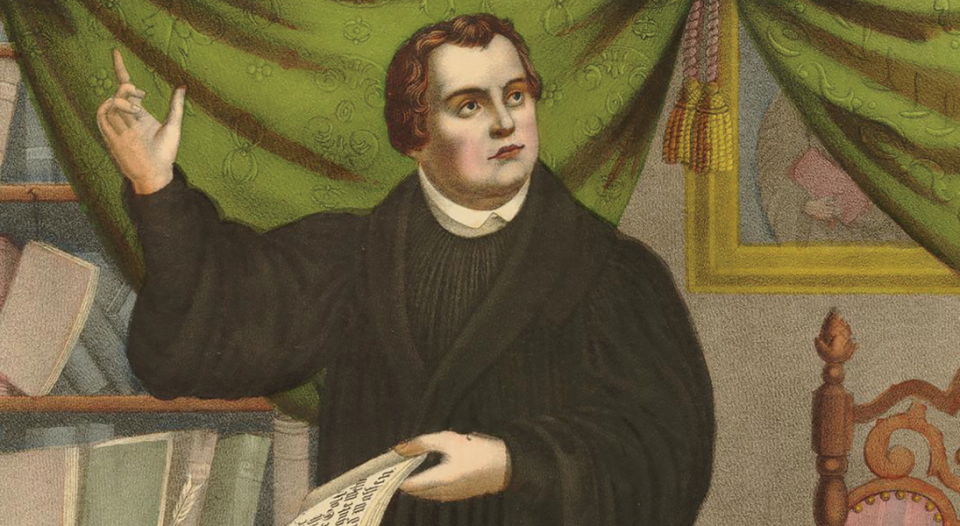Editor’s note: This article originally ran Nov. 24, 2021.
“For all of this I owe it to God to thank and praise, serve and obey him.” With these words in his Small Catechism, Martin Luther concludes his paraphrase of the First Article of the Apostles’ Creed. The point is clear: We owe God thanks for all God gives to us.
But there is a trap here that we can easily fall into. Just because we ought to do something for God doesn’t mean we can do it—or, in Luther’s succinct language: “An ‘ought’ never implies a ‘can.’”
The problem with thanksgiving (let alone praise, service and obedience) is twofold. On the one hand, we try to turn it into a “must,” and we put on our smiley face and say thank you. Every time my Aunt Gladys gave me wool socks for Christmas, I was faced with the same dilemma: I had to write a thank-you note, but I wasn’t really thankful at all. Hypocritical thanksgiving is the very opposite of true thanks.
On the other hand, we imagine that we can manufacture true thanksgiving on our own, and we take credit for being thankful (or feel guilty when we aren’t). But this isn’t true thanksgiving either.
“An ‘ought’ never implies a ‘can.'”
Like all Christian good works, thanksgiving comes spontaneously. We’ve experienced this with children or grandchildren. When they are truly thankful, it’s written all over their faces and they come running up to us with hugs and kisses. Otherwise, their parents whisper in their ears, “Come on, say thank you!” To which they moan, “Thanks for the socks.” So, too, with God.
What creates thanksgiving is not our attitude but God’s gifts. That is why, in his explanation of “I believe in God, the Father almighty, creator of heaven and earth” from the First Article, Luther lists all the things he can think of that God has specifically given him: body and soul with their physical and mental capacities, shoes, clothing, food, drink, house, farm (by this time his wife, Katie, was beginning to purchase land to grow food for the expanding household and their many guests), wife, children, fields, livestock, property and all necessities for life.
Though our lists may vary, true thanksgiving arises not from our work at “being thankful” but out of God’s gifts, which include protection from “all danger … and evil,” as Luther goes on to say in the Small Catechism. Luther doesn’t mean to suggest that nothing bad will ever befall us, only that, when we are shielded from harm, danger and evil, this protection comes from God.
Spontaneous thanksgiving
If you want to be thankful but you can’t do it, make a list of God’s gifts of creation. Or use Luther’s—you’ll run out of ink and paper before you get to the bottom, and like him, you may suddenly realize that “all this is done out of pure, fatherly, and divine goodness and mercy, without any merit or worthiness of mine at all” (First Article).
Some people concentrate on the word “Father” when explaining this article. Luther instead concentrates on the word “creator” and turns “Father” into an adjective: “fatherly.” In 1531, when Luther added an explanation to the words “Our Father in heaven,” his oldest child was 5 and he had discovered his own fatherly heart. “With these words God wants to attract us,” he writes (introduction to the Lord’s Prayer).
In the Bible, we deal with loving children and a loving, divine parent. Thanksgiving will come spontaneously as we discover this “pure, fatherly, and divine goodness and mercy.”
We belong to Jesus, we live in his kingdom, and he frees us from debt.
But still we fail. We take so much for granted, or we fake it, or we break our arms patting ourselves on the back. That’s when a second aspect of Luther’s explanation comes to our rescue in the form of the Second Article of the creed: there Luther repeats the word “ought” or “owe” but in ways that are nearly impossible to capture in English. Jesus Christ “has purchased and freed me … not with gold or silver but … with his innocent (in German, unschuld, meaning “non-owed”) suffering and death.”
We owe everything to God. Jesus, truly human and divine, owed God nothing but gave up everything for us. The result, according to Luther? “He has done all this in order that I may … serve him in eternal … innocence.” There’s that word again. We belong to Jesus, we live in his kingdom, and he frees us from debt.
Thanksgiving arises not because we owe it to God—even though we do—but spontaneously, because Jesus made us his own and frees us to “thank and praise, serve and obey.” Amen! Or, as Luther paraphrased that word in this same explanation, “This is most certainly true.”





